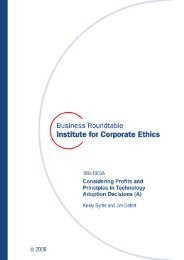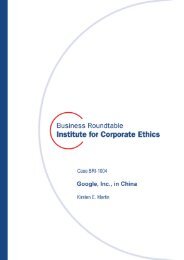A New Approach to CSR - Business Roundtable Institute for ...
A New Approach to CSR - Business Roundtable Institute for ...
A New Approach to CSR - Business Roundtable Institute for ...
Create successful ePaper yourself
Turn your PDF publications into a flip-book with our unique Google optimized e-Paper software.
iNtRoduCtioN<br />
Assume that the CEO of a wellrespected<br />
corporation is asked the<br />
following: “Your company’s products<br />
improve consumers’ lives. Suppliers<br />
want <strong>to</strong> do business with your company<br />
because they benefit from this<br />
relationship. Employees really want<br />
<strong>to</strong> work <strong>for</strong> your company, and are<br />
satisfied with their remuneration and<br />
professional development. And, you’re a<br />
good citizen in the communities where<br />
you are located; among other things,<br />
you pay taxes on the profits you make.<br />
You compete hard but fairly. You also<br />
make an attractive return on capital<br />
<strong>for</strong> shareholders and other financiers.<br />
However, are you socially responsible?”<br />
If a company like the a<strong>for</strong>ementioned<br />
organization is enriching the lives of its<br />
stakeholders, then asking the additional<br />
question of whether or not it is “socially<br />
responsible” simply makes no sense—it<br />
is a meaningless question. If a firm is<br />
doing all the things that this company<br />
does, then it deserves <strong>to</strong> be applauded<br />
and offered as an example <strong>for</strong> other firms<br />
<strong>to</strong> emulate. If it is not doing them as<br />
satisfac<strong>to</strong>rily as particular stakeholders<br />
think it ought, then these stakeholders<br />
could perhaps offer <strong>to</strong> help it do them<br />
better, rather than appeal <strong>to</strong> actions and<br />
responsibilities that lie outside its day <strong>to</strong><br />
day activities.<br />
By talking of business and social<br />
responsibility as if they are two separate<br />
things, we unintentionally promote the<br />
idea that they involve discrete thought<br />
processes and activities. The challenge<br />
is <strong>to</strong> promote a different way of doing<br />
business that integrates considerations of<br />
business, ethics, and society.<br />
Herein lies the problem with<br />
“Corporate Social Responsibility.”<br />
Corporate social responsibility (<strong>CSR</strong>)<br />
rein<strong>for</strong>ces the “separation thesis”—the<br />
idea that we can separate “business”<br />
from “ethics or society.” This separation<br />
is an idea that reaches very deeply in<strong>to</strong><br />
Western culture. It is rein<strong>for</strong>ced by the<br />
disciplines of business, by our major<br />
theoretical frameworks in management,<br />
and by many executives and business<br />
thinkers themselves. At its worst it<br />
generates an absolutely destructive idea<br />
of capitalism—that capitalism is about<br />
“anything goes.” After all, the theory<br />
says, “it’s just business.” Viewed in<br />
this way, corporate social responsibility<br />
becomes an “add-on” <strong>to</strong> ameliorate the<br />
supposedly harsh consequences of this<br />
view of capitalism.<br />
Let us go back <strong>to</strong> the example of<br />
the previously described corporation.<br />
By hiring employees, has it done<br />
something that is “<strong>for</strong> the business?”<br />
The answer <strong>to</strong> that question is a<br />
resounding and unqualified, “Yes.” Has<br />
it done something that is “<strong>for</strong> society?”<br />
The answer <strong>to</strong> that question is also a<br />
resounding, “Yes.” So, how do matters<br />
of employment count—in the social<br />
ledger or the business ledger? A similar<br />
argument can be made <strong>for</strong> cus<strong>to</strong>mers,<br />
communities, suppliers and financiers.<br />
These individuals and organizations are<br />
all full-fledged members of society—if<br />
they benefit in their dealings with a<br />
company, then society benefits <strong>to</strong>o,<br />
directly and indirectly.<br />
Corporate social responsibility is<br />
often about seeming <strong>to</strong> “do good works.”<br />
And, while there is certainly nothing<br />
wrong with doing more good, there can<br />
be an implication that companies need<br />
<strong>to</strong> do good works because the underlying<br />
structure of business is not good, or<br />
morally neutral. This is a destructive<br />
idea—it fails <strong>to</strong> recognize the central role<br />
4 <strong>Business</strong> <strong>Roundtable</strong> <strong>Institute</strong> <strong>for</strong> Corporate Ethics








